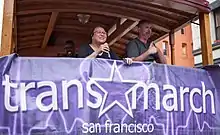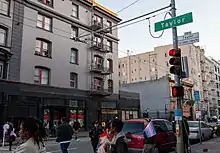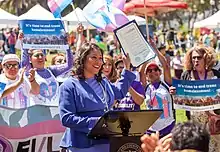Trans March
Annual marches, protests or gatherings take place around the world for transgender issues, often taking place during the time of local Pride parades for LGBT people. These events are frequently organized by trans communities to build community, address human rights struggles, and create visibility.
| Part of a series on |
| Transgender topics |
|---|
|
|
.jpg.webp)
Existrans March Paris
Created in 1997 and held each year since 2002 is the Existrans March in Paris. Since 2007 the March also includes intersex demands. The current name of the Existrans is "Existrans, la marche des personnes trans et intersexes et de celles qui les soutiennent" ("Existrans, the March of the trans and intersex persons and those who support them").[1][2][3]
San Francisco Trans March

The San Francisco Trans March is an annual gathering and protest march in San Francisco, California, that takes place on the Friday night of Pride weekend, the last weekend of June.[4] It is a trans and gender non-conforming and inclusive event in the same spirit of the original gay pride parades and dyke marches. It is one of the few large annual transgender events in the world and has likely been the largest transgender event since its inception in June 2004.[5] The purpose of the event is to increase visibility, activism and acceptance of all gender-variant people.[4]
The event became the fourth main LGBT Pride event in San Francisco; all of which are inclusive and ask for donations instead of requiring paid admission; San Francisco Pride (SF Pride), with a festival on Saturday, parade and festival Sunday; San Francisco Dyke March on Saturday afternoon and march in the evening; and Pink Saturday, which is an evening street party in the Castro District Saturday evening run by the Sisters of Perpetual Indulgence.[4] SF Pride, and the organizers of the other much larger events, all participated in supporting the event since its inception with funds, material and technical support. In recent years, the event has begun at Mission Dolores Park (the same staging and performance area as the Dyke March), and has ended in the Tenderloin, near the location of the Compton's Cafeteria Riot.[6][7]
History



An anonymous e-mail was widely distributed to San Francisco Bay Area's activist and transgender communities in March 2004. It coincided with the first trial in the murder of East Bay trans woman Gwen Araujo and called for a Trans March helping launch "the largest transgender event of its kind."[8] Araujo's murder by four men and their disposing of her body heightened awareness of violence against LGBT people and especially trans women and trans men. Araujo's related case and appeals lasted for over two years. The first several Trans Marches ended with a rally including a trans altar remembering her and many other trans people also killed. Attendance in 2004 was estimated at 2,000; it doubled to 4,000 the following year.[5]
In 2008 Donna Rose, who had resigned from national LGBT advocacy group Human Rights Campaign after the organization supported a version of the Employment Non-Discrimination Act that did not include gender identity, was one of many featured speakers.[9] The theme of 2008 was "Marching for a Gender Inclusive ENDA and removal of Gender Identity 'Disorder' (GID) as a mental illness."[9] Activist Arianna Davis stated to the crowd, "We are mocked by medicine and belittled by the media ... I don't have a mental disorder – do you?"[9] She implored the crowd to "demand that GID be removed from the Diagnostic and Statistical Manual of Mental Disorders (DSM)."[9] Protesters also objected to the current workgroup appointed by the American Psychiatric Association to revise the gender and sexuality sections of the DSM as it included Kenneth Zucker, "known for his gender-conforming therapies in children", and Ray Blanchard, whose theory of autogynephilia "claims that some people transition because they are aroused by female clothing."[9] Attendance of the march, which grew in diversity, was estimated at 10,000.[9]
In 2009 the now ten-person coordinating committee elected to forgo the Castro gay neighborhood and instead march through the predominantly Latino Mission District.[4] They cited several reasons: for one, many transgender people lived in the neighborhood, unable to afford the pricier Castro; organizer Fresh White noted the need to heighten transgender visilbility because of the "tremendous amount of violence that happens" to transgender people in the neighborhood; finally, the area also had a lot of residents who voted for Proposition 8, the Californian legislation the changed the state constitution to limit marriage rights to only gender binary male-female couples.[4] Organizers expected 10,000 attendees and the event to cost $10,000 much of it raised through sponsorships and fundraisers.[4] Cecilia Chung, a trans woman and the chair of the San Francisco Human Rights Commission, was the keynote speaker.[4]
In 2015, Ryan Cassata was the headlining musician and TAJA's Coalition was the headlining speaker. Laverne Cox also spoke briefly. An estimated 10,000 - 20,000 people marched from Mission Dolores Park to UN Plaza. The Civic Center was lit up in the colors of the transgender pride flag.
In 2016, attendees expressed anger at local politicians who attempted to speak at the event.[6][10][11][12] At the conclusion of the march, a new street sign was unveiled, renaming the 100 block of Taylor Street to Gene Compton's Cafeteria Way in honor of the Compton's Cafeteria Riot.[6][12][13]
In 2017, the march concluded with an announcement that the area at Turk and Taylor in the Tenderloin had been designated a Transgender Cultural District by the City of San Francisco.[14]
In 2019, San Francisco Mayor London Breed held a press conference with the Office of Transgender Initiatives prior to the march. Breed declared June 28, 2019 - the day of that year's Trans March and the 50th anniversary of the Stonewall riots - to be "Trans March Day", and announced a housing program for trans residents.[15]
Toronto Trans March
The Toronto Trans March was founded in 2009 by Karah Mathiason[16] and typically takes place on the Friday of Toronto Pride Week. The trans community in Toronto had seen resistance to the idea of a trans march for years, and in 2009 Karah Mathiason decided to create the march for herself. In 2009, Toronto Pride attempted to confine the newly formed Trans March to the sidewalks of Church Street up to Wellesley Street. Instead, participants took to the streets and marched past the barriers on Wellesley Street. Since 2009, Toronto Pride has consistently stood in the way of the Trans March, often trying to confine it to minuscule portion of Church Street while the Toronto Dyke March and Toronto Pride Parade march down Yonge Street.
In 2012, Toronto Pride attempted to restrict the Trans March from Norman Jewison Park down Church Street where vending booths were set up and pedestrians were still walking around the street. The "official" march received relatively little attention and occurred amidst oblivious pedestrians until it finally reached Wood Street. Upon arriving at Wood Street, marchers who were aware of alternative plans split off and marched down Yonge Street to Dundas Avenue.
In 2013, Toronto Pride again attempted to mislead marchers, but this time activists prevailed. The Toronto Trans March began at Norman Jewison Park and marched down Yonge Street to Allan Gardens on Sherbourne and Carlton. It was the largest unified Trans March that has occurred in Toronto to date. Between 1000 and 2000 people are believed to have marched in the Toronto Trans March 2013.
Community Conflicts
During the organisation of the Toronto Trans March 2013, a conflict occurred following a decision made during one organising meeting to accept a request by the LGBT Consultative Committee of the Toronto Police Services to march in the Trans March. Many in the community objected to a police contingent of the march, because they felt that it disregarded the ongoing reality of police brutality and harassment against trans people in Toronto. In the end, a community letter was presented to the LGBT Consultative Committee and the contingent did not march.
Other cities
In 2007 a Trans March started in Minneapolis-St. Paul.[8]
In Philadelphia, the first Philly Trans March was held in 2010.[17]
In London, the first Trans Pride march was held on 14 September 2019.[18]
See also
- Dyke March
- International Transgender Day of Visibility
- List of LGBT awareness days
- List of LGBT events
- National Trans Visibility March
- Trans October
References
- "Transgender and Intersex Community Marks 20 Years of Marching in Paris (Video)". www.advocate.com. 2016-10-19. Retrieved 2019-07-16.
- "Existrans 2018, pour les droits des personnes trans' et intersexes : "On est dans une situation d'urgence"". TÊTU (in French). 2018-10-12. Retrieved 2019-07-16.
- à 19h11, Par M.-L. W. avec AFPLe 13 octobre 2018; À 19h41, Modifié Le 13 Octobre 2018 (2018-10-13). "Trans et intersexes mobilisés contre les interventions chirurgicales non consenties". leparisien.fr (in French). Retrieved 2019-07-16.
- Changes afoot for SF Pride events: Trans March Matthew S. Bajko, 25 June 2009. Bay Area Reporter. Archived February 24, 2012, at the Wayback Machine
- Trans March on Friday Rob Akers 6/22/2006. Bay Area Reporter. Archived 2011-09-18 at the Wayback Machine
- Chavez, Lola M. (June 25, 2016). "SF Trans Celebration Boos Pols and Says No to More Police". Mission Local. Retrieved June 25, 2016.
- Mamidanna, Sruti (June 29, 2019). "PHOTOS: S.F. Pride Weekend Kicks Off With Trans March". KQED. Retrieved June 30, 2019.
- Trans March kicks off Pride weekend Vickie Martin, June 2006, Bay Area Reporter. Archived 2015-09-23 at the Wayback Machine
- Trans March rallies around inclusion Zak Szymanski, 07/03/2008. Bay Area Reporter. Archived October 11, 2008, at the Wayback Machine
- Djegal, Philippe (June 24, 2016). "VIDEO: San Francisco city leaders booed off stage at Pride weekend kickoff event". KRON. Retrieved June 25, 2016.
- "SF Mayor Lee among politicians booed off stage at Pride Trans March". KTVU. June 24, 2016. Retrieved June 25, 2016.
- Kukura, Joe (June 25, 2016). "Video: Politicians Booed As Trans March (Un)Officially Kicks Off SF's Pride Weekend". SFist. Archived from the original on June 28, 2016. Retrieved June 25, 2016.
- Staver, Sari (June 23, 2016). "Street renaming highlights Trans March". Bay Area Reporter. Retrieved June 25, 2016.
- "Despite feeling under attack, community remains resilient for Trans March". KTVU. June 23, 2017. Retrieved June 23, 2017.
- "San Francisco kicks off Pride with Trans March and historic announcement". City and County of San Francisco. Retrieved June 30, 2019.
- Paul, Gallant (June 18, 2009). "Trans march 'overdue'". Toronto Star. Retrieved 28 June 2016.
- Myers, Michelle (October 17, 2019). "Philly Trans March 2019 remembers transgender people murdered in Philadelphia". Al Día (Philadelphia). Retrieved October 18, 2019.
- "London's first Trans Pride support 'overwhelming'". bbc.com. 2019-09-14. Retrieved 2019-09-16.